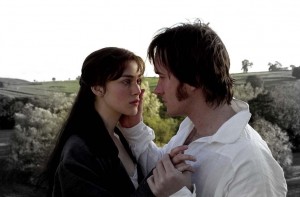Romance in Pride and Prejudice: Sometimes, We Settle
February 18th, 2013 | 8 min read
By Guest Writer

It is axiomatic that an artist’s work will be admired and disdained for a single set of qualities. Some admire the breadth and passion of Beethoven while others find his stamina and pathos tedious. Some admire the precision and pacing of Kubrick’s films while others find them pretentious. Jane Austen is no exception; her longevity is like that of any other significant artist. The defenders and detractors never stop having their arguments about the worth of her work.
It may be worth revisiting Pride & Prejudice, which is two hundred years old this year, to consider what distinguishes her romances from contemporary romances. After all, Elizabeth Bennett is not the kind of character we can imagine will be convincingly portrayed by a Meg Ryan or a Kate Hudson, or even a Julia Roberts. Lizzy and Jane are not heroines who lend themselves to being championed by America’s sweethearts in just about any generation of film.
Arguably, Noah Berlatsky, writing for the Atlantic, has summed up the paradoxical appeal of Austen’s work: “She has to be one of the least romantic writers ever to write romance.”
Austen’s tales of romance may endure because she put so little stock in romance as we tend to define it. In an Austen novel, career advancement, real estate values, the size of an entailment, and the social and fiscal connections that come with marriage all matter. If that seems unappealing it is because we can’t conceive of a culture in which a marriage could be arranged to benefit clans rather than as the culmination of a quest for a “soulmate.” We also live in a culture which, in some sense, denies the inevitability of death. And so Austen’s tales of matrimony and negotiation don’t make sense to us because they are often, as Berlatsky put it, as “small as life.” Americans want life to be bigger and grander in every respect than a life could be in Jane Austen’s time.
But a title like Pride & Prejudice suggests that however domestic the tale, Austen’s themes are hardly small. Just as stories about war are rarely “just” about war, Austen’s tales of romance are not “just” stories of people who marry. The title tips us off to character flaws before we’ve even opened the book. Though Elizabeth and Darcy are not imbued with a social or symbolic significance as apocalyptic as Dostoevsky’s characters, they do represent ways of living life. That Austen is quotidian where Dostoevsky is apocalyptic, that Austen is mundane where Dostoevsky is grotesque hardly means she was not writing about ideas. Austen had an eye for the mundane details with which philosophies of life must contend on a daily basis. Dostoevsky wrote about the personal and social cataclysms that philosophies create when untempered by other ideals. But it is the dry domesticity of Austen’s narrative world and the long term decisions made within it that give her characters’ decisions weight. Irreversible life-altering decisions hinge on a person’s ability or inability to make the right decision after observing mundane details.
The marriages that take place in the novel are made by people following ideals (Elizabeth and Darcy), altruistic affection (Jane and Bingley), pragmatism (Charlotte and Collins), and visceral chemistry (Lydia and Wickham). While it is obvious that Austen did not endorse the latter pairings, it is equally clear she shows us the latter two couples are not at all disappointed with their respective catches. Charlotte Lucas isn’t ruined by settling for Mr. Collins any more than Lydia is unhappy to be married to Wickham. Charlotte realistically assessed herself, knew marriage to be a sure defense against poverty and loneliness, and pragmatically accepted the best offer she had. Charlotte could tell Lizzy that Lizzy had the luxury of being beautiful enough and clever enough to actually turn down proposals. But Charlotte had neither and so went with her best option. Austen’s stories are stories in which social, economic, and sexual capital are all part of a calculation for a plausible pairing as a business decision, not merely a quest for true love. But even Lydia, silly as she is, never seems unhappy with Wickham or the support they get from the Darcys by books’ end. They just continue as they do.
Today we may recognize that the ideal is Lizzy and Darcy, but when our culture advises to settle we prefer to settle for Lydia and Wickham rather than Charlotte and Collins. The love that bursts forth like a fire, demolishing property and removing clothing, was the sort that Austen made fun of. Yet in the 21st century that sort of attraction is so taken for granted that director Joe Wright determined that Austen was too discreet to tell us the real reason Lizzy and Darcy fall for each other. So it turns out for a contemporary film-maker to sell himself on Lizzy and Darcy he has to believe they were drawn to each other like Lydia and Wickham. They are now heroes for sublimating their desire more decorously than others. But that sort of erotic obsession goes past the point of even Lydia and Wickham to become the obsession of Dmitry Karamazov with Grushenka, only benefiting from the refinement of English manners.
In Austen’s actual novel, Lizzy and Darcy must overcome their own character flaws to discover they love each other. In Wright’s film they simply need to contain themselves long enough to get social permission to do what they soon realized they wanted to do. Cinema is full of tales where transgressive love is prized as a philosophical statement. “Theirs was a forbidden love” has been the clarion call to more than one or two made-for-TV-dramas. If the sparks create a fire hot enough then the heat was worth it. This ethos is so prized it was shoe-horned into a Jane Austen adaptation. Apparently without that spark we won’t believe her story in our time.
Even evangelicals who claim that we should not be like the world still seem to want that devouring spark. When evangelical speakers and writers say that a marriage founded on anything but mutual love and attraction is going to fail, this indicates ignorance not merely of literature but of history. Negotiated lives together have happened in all sorts of ways. Because the spark of mutual sexual attraction inevitably wanes, friendship is important.
So far, so obvious. But great art, music, and literature help us avoid underestimating the obvious. Charlotte and Mr. Collins may not know the rapturous heights of mutual affection that Lizzy and Darcy know, but neither do they feel the imagined betrayals or wounded egos with bitterness and shame. For Mr. and Mrs. Lucas the whole thing was to make sure the clergyman had his wife and the wife had her home. Having asked for no more than that and having found it, that was that. Though they may seem insultingly insular and provincial to us, they found their happy ending.
That Austen showed us happy endings even for those who settled in marriage is a reason for her greatness. It is because we know the marriages in that time and place could not be simply annulled that Charlotte’s decision bears a hint of tragedy. She settled, and she settled in a way we hope never to do. And by novel’s end Lydia and Wickham also settled, in their own way. In their world there can be no seven-year itch in which they reconsider their choices. But both couples seem happy, if not wise, and by contemporary American romantic tropes they may be sitting in a church pew near you or me.
Jeremiah Lawson writes.